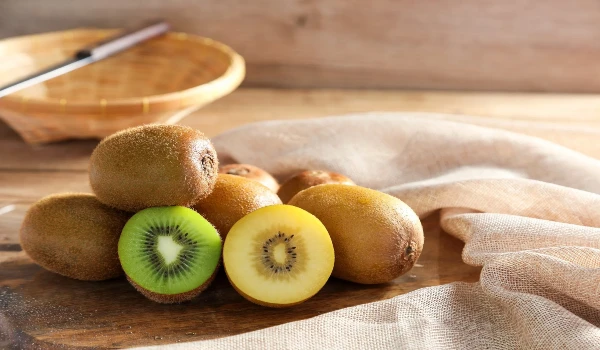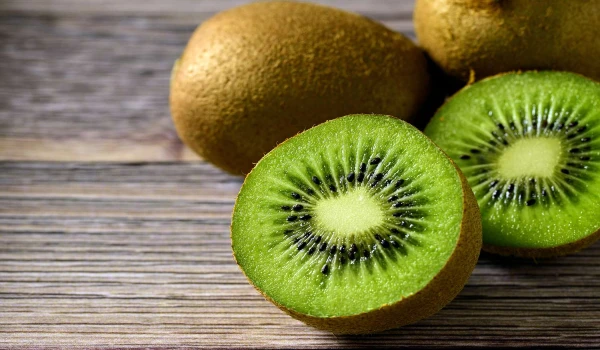Kiwi benefits, storage method, calories, ripening method, season
Kiwi Nutrition

| Kiwi (100g) Nutrition | |||
| Carbohydrate | Protein | Fat | Calories |
| 15g | 1g | 0.4g | 62kcal |
| Main Nutrition | Lutein, vitamin C, vitamin E, dietary fiber | ||
| Main Benefits | Promotes heart health, boosts immunity, and relieves constipation | ||
| Side Effects | Excessive intake may cause diarrhea and abdominal pain, and is not compatible with chestnuts and wine. | ||
Kiwi is characterized by a sour yet sweet taste, and is rich in vitamin C and dietary fiber among fruits, so consuming one kiwi a day can meet the daily recommended amount of vitamin C. It helps with heart health, digestive health and immunity, and various diseases. In addition, it is a delicious and healthy fruit that is low in calories and great as a snack.
Kiwi Benefits

1. Vision health
Kiwi is rich in lutein. Lutein, a component of the retina, helps improve eye function and prevent age-related eye diseases such as cataracts. Additionally, the antioxidant vitamins and carotenoids in kiwi can help prevent eye diseases and promote overall eye health.
2. Relieve stress
Vitamin C is effective in relieving stress because it promotes the secretion of cortisone, a hormone that has a stress resistance effect. The sweet taste and scent can also help relieve depression and generally relieve most symptoms related to stress.
3. Hair health
Ingredients such as folic acid, amino acids, and tyrosine in kiwi are also effective for hair health. Additionally, large amounts of vitamins can help keep your scalp healthy and strengthen your hair.
4. Strengthen immunity
Kiwi contains abundant amounts of vitamin C, which improves the body’s immunity. In fact, kiwi contains about 230% of your daily recommended intake of vitamin C, making it a rich source of immune-boosting nutrients. They are also rich in antioxidants, which can protect the body from various inflammations and diseases.
5. Prevention of heart disease
Kiwi has properties that lower blood pressure. It maintains healthy blood pressure, increases vitamin C, and is also rich in vitamin E and magnesium, which can reduce the risk of stroke and heart disease. It may also lower cholesterol levels.
6. Relieving Constipation
Rich dietary fiber dilutes stool and aids healthy bowel movements. This helps prevent constipation and promotes gut health.
Storage Method
If you want to post-ripen, store at room temperature for 3 days in a place out of direct sunlight. Store ripe kiwi in an airtight container and refrigerate. If you want to store it longer, you can freeze it and store it for up to 3 months.
Post-ripening method
Some people like the crunchy texture of kiwi, but it is usually a late-ripening fruit that is best eaten when cooked slowly. As post-ripening progresses, sweetness, aroma, and juice become abundant. If you want post-ripened kiwi, you should store it at room temperature for 3 days before consuming it.
Season and harvest time
The season and harvest period is March to May and September to November, when the flesh is the sweetest and most delicious.
Side Effect
- Due to its rich dietary fiber, consuming large amounts can cause diarrhea, so it is recommended to consume no more than three servings a day.
- When eating kiwi, which is high in folic acid, it is recommended not to consume foods high in tannin, such as green tea, chestnuts, acorns, or wine, as the tannin content interferes with the absorption of folic acid.
- Folic acid is destroyed when heated, so it is best to consume it as raw fruit.
References
🔹MedicalNewsToday: Eating kiwi could help boost your mood, researchers say
🔹PharmEasy: Kiwi: Uses, Benefits, Side Effects and More!
🔹CARE Hospitals: 12 Health Benefits of Kiwi Fruit